Mark Wandering Medicine has sacrificed more than most for his country. He served six years in the US marines, fought through the bloodiest years of the Vietnam war and almost lost a leg when his scouting unit was ambushed near the North Vietnamese border in 1972.
Since he returned home to the Northern Cheyenne reservation in Montana, however, he has received scant thanks for his service. He spent 13 years battling government bureaucrats before receiving his first disability payment. Like many Native Americans raised on desperately poor reservations in remote parts of the country, he has never lived far from the poverty line.
Now he is fighting once more, this time to overcome a century and a half of disenfranchisement and secure voting rights for his fellow Native Americans. He has barely voted over the past 40 years, not because he hasn't wanted to but because it has been too difficult. The only sure way to register to vote, he says, is to make a 157-mile round trip from his home to the nearest county seat.
There is no public transport, and most people can't afford the trip – even assuming they have a working car with valid license plates and insurance, which is rarely the case. The few who do make the journey have to run a gauntlet of racism and hostility that, they say, can often land them in jail on charges of drunkenness and public disorder.
'When is our country going to love us back?'
For decades, Wandering Medicine and his fellow tribal members took the fatalistic view that there was no point battling a system that has always worked to exclude them. Now, with the Native American population growing faster than the rest of Montana but with no end in sight to the well-established cycle of unemployment, poverty and alcohol and drug addiction, he and a handful of other combat veterans have decided that enough is enough.
"We love our country, we do," he says forlornly, a brightly colored marines ball cap perched on his head, as he points out the dilapidated housing, broken-down trucks and stray dogs that characterise the streets of Lame Deer, the reservation's main population centre. "But when is our country going to love us back?"
Wandering Medicine is now the lead plaintiff in a federal lawsuit filed on behalf of four Indian tribes in Montana – the Northern Cheyenne, Crow, Gros Ventre and Assinboine – who say they are systematically denied access to both voter registration and the absentee balloting privileges that are routinely accorded to white Montanans. For more than a year, the tribes have asked for satellite voting offices to be established directly on their reservations in the 60 days before elections, so they can register and cast votes with the same ease as most white voters. A Native American rights organization backing the lawsuit has even offered to pay for the offices, arguing that they could easily double voter participation on the reservations. But the county authorities, along with Montana's state election officials, have steadfastly refused to grant the request, offering a panoply of excuses, many of them contradictory. Racism and political animus, they insist, have nothing to do with it. And yet, much is at stake. A stronger Native American constituency, in Montana and across a number of Great Plains states, could quickly shift the balance of power on county commissions for the first time since the white man settled the American west. It could also help sway pivotal senate and gubernatorial elections in the region, many of which have come down to a few hundred votes over the past decade and may do again as Republicans fight to regain control of the Senate next year. "Native Americans make up just 1.7% of the US population, but it's strategic," says Tom Rodgers, a Blackfeet Indian from northern Montana who works as a Washington lobbyist for many tribes, rich and poor, and has raised most of the money for the lawsuit. "This is spiritual, and this is fate. It is poetry."
'History is an adventure that shouldn't be missed'
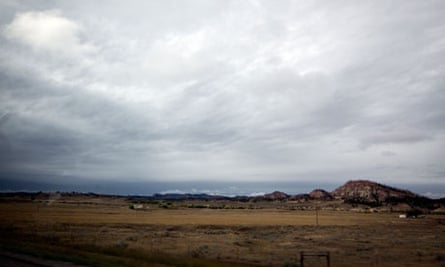
The poetry is evident, in fact, in the characters due to line up in front of the ninth nircuit nourt of appeals on 10 October. On one side is Wandering Medicine, whose great-grandfather helped rout George Armstrong Custer and the US 7th Cavalry at the Battle of Little Bighorn, 20 miles west of Lame Deer. And on the other is the elections clerk for Rosebud County, Geraldine Custer, whose husband is a direct descendant of the ill-fated general. The county seat, a speck of a town called Forsyth, is named for the general who oversaw the Indian massacre at Wounded Knee, South Dakota, in 1890.
The wounds of the past heal slowly in this part of the world. Or, as a local tourist guide says: "In south-east Montana, history is an adventure that shouldn't be missed."
It was after the Indian wars of the 1870s that the indigenous tribes started to be consigned to reservations – on the worst, most desolate lands for grazing or growing crops. Until 1924, Native Americans had no right to vote in Montana. They were not allowed to serve as voter registrars until 1975 and were not commonly elected to county commissions until the federal courts found in the late 1980s and early 1990s that the voting system was unfairly rigged against them. To this day, disincentives to Indian voting are rife. Voter turnout on Montana reservations runs at about 30%, less than half as much as the turnout for tribal elections that require no long car journeys or visits to the courthouse. Native Americans across the state vote at no more than 60% of the rate of white voters and sometimes as low as 35%. By contrast, turnout for tribal elections, which require no long car journeys or visits to the county courthouse, runs as high as 70%. Rodgers sees a direct parallel between the treatment of Native Americans in the north-west now and the treatment of African Americans in the South at the dawn of the civil rights era. "South Dakota is the Mississippi of the Great Plains," he said. "Sadly, Montana is becoming the Alabama." Like the civil rights movement, this political awakening has been sparked, among other things, by Native Americans feeling aggrieved that they are good enough to fight and die in America's wars – the military being one of their few viable career options - but not to vote when they return. Eighteen months ago, Rodgers was outraged to learn that there was no money to provide a traditional funeral ceremony for a Northern Cheyenne member who had been killed by an IED in Afghanistan. Rodgers raised and delivered the money himself, only to become more outraged when other veterans in Lame Deer told him about the voting impasse.
Almost immediately, he and his lawyer began petitioning the Montana secretary of state's office to open up satellite offices, but their requests were not even acknowledged for two months. When Rodgers and his fellow members of a rights organisation called Four Directions finally got a meeting with secretary of state Linda McCullogh, they were told that state law precluded the establishment of the satellite offices and their best option was to seek a change from the legislature, which is controlled by Tea Party Republicans and is notoriously hostile to Native American interests.
Not only did Four Directions take this as a brush-off; the advice turned out to be wrong. Montana's attorney general issued an opinion a few weeks later pointing out that satellite offices already existed for government services such as vehicle registrations, and there was no reason not to open new ones for voting. The secretary of state then changed her argument, saying it was up to the counties to decide whether to install satellite offices. She was all in favour of them, she insisted, but had no say in the matter.
'The weight of history'
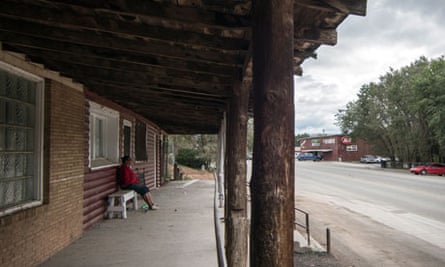
By then it was almost election day. A district judge was petitioned for an emergency ruling – he found for the counties and the secretary of state, based on a reading of the Voting Rights Act that the Justice Department later determined to be flat wrong. The judge, Richard Cebull, was embroiled in scandal at the time because of a racist joke about President Obama he had distributed by email. He was forced into retirement shortly after.
The battle grew wider and nastier, as the American Civil Liberties Union and the Justice Department in Washington weighed in on behalf of the tribes. Four Directions unearthed evidence that the counties were spending far more on legal fees than they would have done on satellite offices. The lawyer representing the counties – Sara Frankenstein, a feisty Republican Party operative and former Miss South Dakota – sought unsuccessfully to have those fees paid by the plaintiffs.
And so this week's courtroom showdown approaches. It seems unlikely that the ninth circuit will contradict the Justice Department's reading of the Voting Rights Act, but the defendants are giving in their best shot anyway. Frankenstein, who says in her official bio that she "particularly enjoys defending public bodies from lawsuits brought by the ACLU and other 'civil rights' groups", argues that this is not about fundamental voting rights but rather about "convenience" voting. "Convenience is very nice, but it has a cost to the county," she said in an interview. She also argued that satellite offices were unworkable because state law insisted on absentee ballots being issued sequentially – something she believed was impossible if they were issued by more than one office per county. Her opponents pointed out the existence of telephones and computers to overcome the problem. The secretary of state's legal adviser, meanwhile, acknowledged that his office was under an "obligation" to maximize access to the vote and he was briefly at a loss for words when it was pointed out that fighting against satellite offices appeared to be doing the opposite. "We can only act how the law allows us to act," the advisor, Jorge Quintana, said at length. "There are all kinds of things the secretary of state would like to change about voting procedures in Montana. We can only do what the law allows us to do." Back on the reservation, that attitude is regarded only with scorn. "I see [Linda] McCullogh's behavior as a betrayal," tribal council member Jace Killback said. "She's catering to non-Indians and very patronising to us Indians. Our issue is to increase voter turnout and empower our people through participation. "What we're seeing is the weight of history. The Lakota, Arapaho and Cheyenne Indians resisted the white man the longest. They are the ones who are still suffering the most."
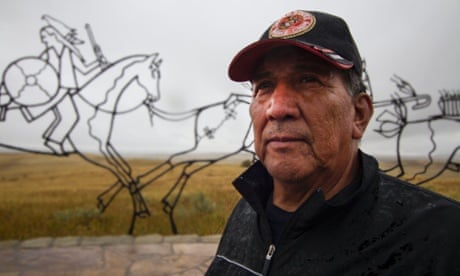
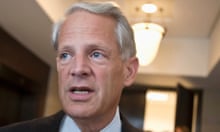
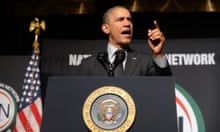
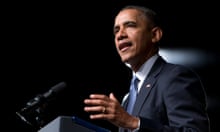
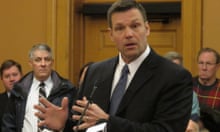
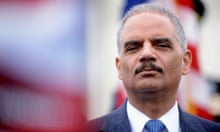
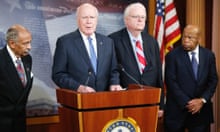
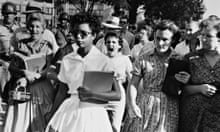
Comments (…)
Sign in or create your Guardian account to join the discussion